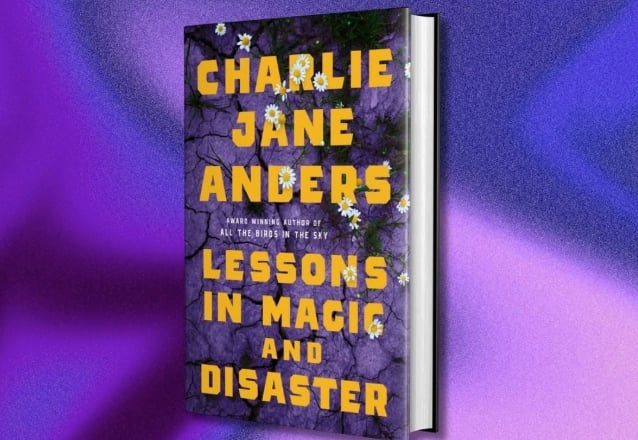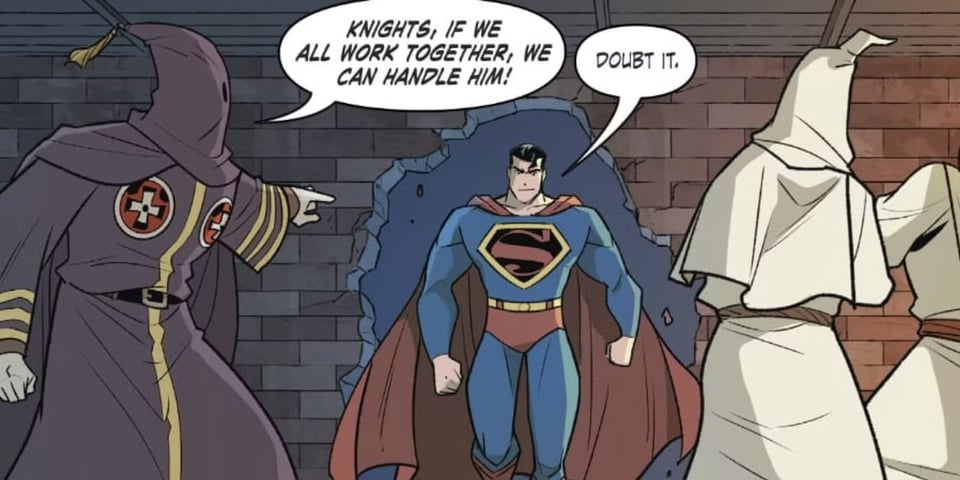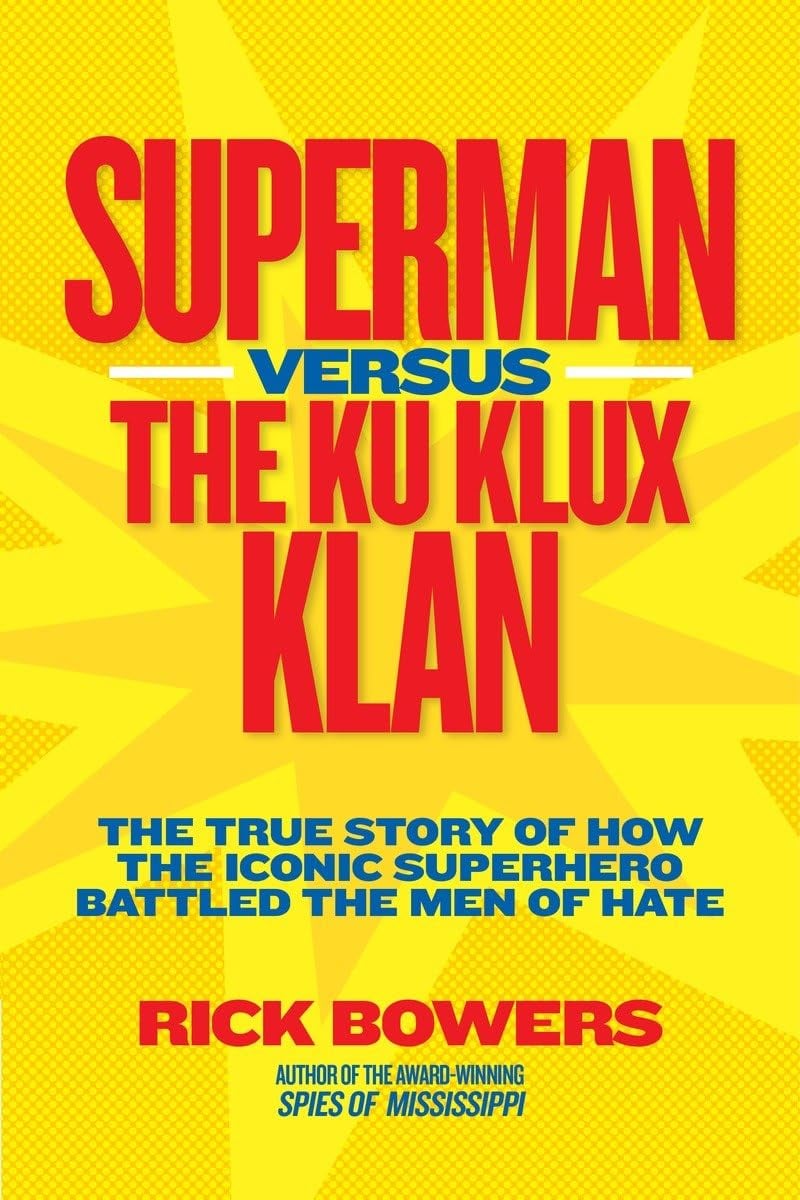What We Can Learn From Superman Defeating the KKK
My book Lessons in Magic and Disaster has been out for a week now, and I’ve been so thrilled with the response so far. Bookseller Rowan Julian with The Novel Neighbor in St. Louis calls it “a firecracker of a book” and “one of my favorites of 2025!” Bookseller Julie Goodrich with Beaverdale Books in Des Moines calls it "one of my favorite books of the decade" and says "I loved every minute of this story, even when it hurt."

Upcoming events:
This weekend, I’m going to be at Dragon Con!
And then on Tuesday at 7:30, I’m taking part in a queer reading and discussion at Charis Books in Decatur, GA.
The following weekend, I’m going to be at Rose City Comic Con in Portland!
And then I’ll be at the Baltimore Book Festival on Sept. 13.
On Sept. 19, I’m hosting another Writers With Drinks in San Francisco, featuring Michal “MJ” Jones, Renée Swindle, Annalee Newitz and myself. It’s at Strut in the Castro!
And just a reminder that if you still want a signed/personalized/doodled copy of Lessons in Magic and Disaster and can’t get to one of those events, you can order one from Green Apple. They ship all over the USA!
How Superman Defeated the KKK, and why it matters
Here's a confession: after a week on book tour — which was awesome! — I don't really have the spoons to put together a brand new newsletter from scratch. But luckily, something great kind of dropped into my lap, and I'm excited to share it with you.
So... back in 2016 or 2017, I interviewed Rick Bowers, the author of Superman vs. the Ku Klux Klan: The True Story of How the Iconic Superhero Battled the Men of Hate. This is a non-fiction book about the real-life story of how the Superman radio show helped to expose the secrets of the KKK in the late 1940s. (This storyline was more recently adapted into the comic book Superman Smashes the Klan by Gene Luen Yang and Guruhiru.)

I was hoping to write up my interview about Superman vs. the Ku Klux Klan for a major publication, but they ended up passing on it -- which happens. And then I lost the audio file, which was a bummer. But a few weeks ago, I was looking for something else, and I stumbled across the audio of that interview. Which, y'know, feels more timely than ever at this point. I got it transcribed by the lovely folks at stellartranscriptions, and now I'm excited to share it with y'all.
And Rick, if you're reading this -- I'm sorry it took like eight years for this interview to get published!
The KKK were making a comeback after WWII
The Klan suffered a decline in popularity during World War II, which Bowers says they tried to rationalize by saying that "there was a shortage of bed-sheets in America, so they couldn't dress up for their rallies."
In fact, though, the U.S. government "was not looking kindly on any extremist groups" at home while we were fighting the Nazis abroad, Bowers says. The Klan's leaders deliberately kept a low profile. Adds Bowers,
"Immediately after the war, the Klan launched an attempted revival, and the Grand Dragon down in Atlanta, Sam Green, called a rally on Stone Mountain. Stone Mountain is this big mountain outside of Atlanta, where the Klan had a massive cross burnings. And a thousand people showed up for this cross burning. And hundreds were initiated into the Klan, and it ended up as a major spread in Life magazine, which of course the Superman producers would have been privy to."
This was a moment, says Bowers, when people were "trying to figure out which way the country is going to go post-World War II. Is it going to be inclusive? Is it going to be open to diversity? Or is it going to go into a cocoon and kind of brand people as the other?"
Enter Superman.
The Superman radio show went after the KKK hard
In 1946, the Adventures of Superman radio show was looking for a new focus for its storylines. "The producers come up with a new idea to actually shed light on prejudice and bigotry right here at home," says Bowers.
Superman was the perfect hero to star in an anti-KKK story, according to Bowers. The creation of "two Jewish kids in Cleveland," who were "scrawny 99-pound weaklings" in high school, Superman represents everything Siegel and Shuster fantasized about. In creating Superman, they drew on pop culture of the time, "but also upon their Jewish heritage to make him this fantastic immigrant from another planet who is here to help" all of humanity.
"The early Superman was very much a crusader for social justice," says Bowers. "And it was Jewish publishers who put him in comic books, because most Jewish publishers were kind of kept out of mainstream publishing, but were left to have this little token of the comic book world." Superman became hugely popular, though most people were unaware of his Jewish roots.
"So it almost made sense when the radio producers decided to use Superman as a way of weapon against internal hate groups," says Bowers. "They had just seen the Holocaust. The Klan was kind of trying to resurrect itself at that time."
How the Superman radio show got the KKK dead to rights
"The producers knew that they were going out on a huge limb," Bowers says. "This is a popular radio serial targeted at kids around the country. And they're going to come out with a story that talks about how hate groups operate right here in the US and target minorities both with hateful speech and violent acts." So they "went to just incredible lengths to authenticate the scripts."
The producers "left no stone unturned in doing their research." And they were able to work with the Anti-Defamation League in New York, "which had infiltrators inside the Ku Klux Klan. And some of the information from those infiltrators went into the Superman scripts," says Bowers. As a result, the Superman radio show was presenting real details about the secret codes the Klan was using, along with details of their plans and how their meetings went.
Adds Bowers:
"So when you listen to the shows, the description of the layers of the Klan, the top people who are in it more for making money than making a point about ideology, which was true. [And] the kind of ignorant, bigoted person who's in it out of a sense of inferiority and wanting to feel superior to others -- that was true. The description of their rituals, their cross burnings and the robes they wore were very authentic."
The storyline didn't name the KKK, instead focusing on a group called the "Klan of the Fiery Cross," says Bowers. But "it looks and feels like the KKK," and the scripts were meticulously authentic -- to the point that they contained up-to-the-minute information about what was going on with the Klan.
"They actually rejected multiple scripts before finally finding a script writer who could actually do this justice," says Bowers.
At one point, the show's producers visited Margaret Meade, the famous anthropologist. According to Bowers, Meade cautioned them: "'You don't want to put anything on the air that would interfere with the serenity of the children.' The producer of the radio show, Robert Maxwell, almost fell out of his chair and said “What makes you think we're in the serenity business?'"
At the same time, the producers were determined to make the show as entertaining as possible -- the cliffhangers needed to be "sensational," to keep kids coming back for all sixteen weeks. The villains would be utterly evil, and Clark Kent, Lois Lane and Jimmy Olsen would need to be brave in facing them down.
At the same time, Bowers says Maxwell and the other producers knew they were going "way out on a limb with this."
The show reached 5 million listeners
As soon as the anti-KKK storyline started, says Bowers, "the ratings skyrocketed." Five million children were listening to the show, and started acting out the adventures of Superman against the evil Klan at home. "The media gave Superman all kinds of applause," adds Bowers. "And various industry groups gave the radio show their awards."
At the Klan's headquarters in Atlanta, the Klan's leaders were freaking out because "a kids' radio show was poking fun" at them. The producers received death threats from the Klan in New Jersey. But the radio show spawned a whole strategy for dealing with the Klan: making fun of "their ridiculous hoods and robes and their silly signs and invented language," says Bowers. "That helped to kind of diminish their power later on."

The main lesson Bowers takes from this? If you're going to take on malicious institutions that have embedded themselves in American life, you need to make sure you're telling a damn entertaining story.
Says Bowers, "the lesson, I think, from the Superman radio series was never compromise the story. It was totally significant that the ratings skyrocketed. And the producers went to great lengths to never compromise the integrity of the show, the entertainment value of the show. But they never pulled any punches in pointing out, you know, the negative points of bigoted thinking and bigoted organizations like the Klan."
Could something like this happen today?
Superman is still telling political stories, for sure — his most recent movie caused some online controversy with its storyline about stopping a genocide and battling an evil tech billionaire. But I don’t know if we’ll see the Man of Steel confronting white supremacist organizations with this level of scrutiny and vigor any time soon.
I asked Bowers if something like Clan of the Fiery Cross could happen today, and he wasn't sure. The moment that produced that Superman radio show was very different than this one, and entertainment has changed a lot. At the same time, he noted that superhero comics still feature some intensely political stories, including battles against Nazi organizations like Hydra. "We live in different times," he added. "In some ways, things have gotten a lot better, [but] we worry that we're kind of sliding back."
If someone did a storyline today, there would definitely be a lot of yelling that it was "stereotyping the white man," says Bowers. "They'd be accused of having a point of view."
Says Bowers:
"What if there was a movie where a major superhero actually took on social issues in the real world in a way that made people stand up and take notice? Would the producer be willing to take that risk with their characters, with their franchise, with their billions of dollars in revenues? Now, I don't know. I think that in different ways people will continue to stand up for these kinds of ideals."
Bowers says the Superman/KKK story is "an object lesson for all of us today that in whatever role that we play in society, if we think creatively and if we kind of embrace values that are inclusive of all people, we can help to shed some light on some of the issues that still surround prejudice, racism, bigotry... today more than ever."
Looking back at this interview from 2017 — when there was a move to make a film about the real-life story of how Superman defeated the KKK — it’s hard not to feel a bit depressed, by how much worse things have gotten since Bowers told me that white supremacy was making a comeback and we needed more stories like The Clan of the Flaming Cross. I do not believe, in 2025, that major corporations are going to be doing this work — which means we need to be doing it ourselves.
Two things stand out for me from Bowers’ comments:
1) It wasn’t just that the radio show had accurate info about the Klan and depicted it as evil. They also showed ruthlessly how the Klan’s leaders were only out for personal financial gain, and the rank-and-file were insecure and wanted to feel better than someone else. We need that level of realness in viewing today’s fascists.
2) You really do have to make it entertaining and fun, focusing on excitement and thrills.
I feel like pop culture is full of stories about evil billionaires and corporations — but maybe we do need more unstinting examinations of the kind of rubes who get swept up in these movements, and how pitiable they are. Show them as the villains they are, let us root for their downfall. (Or hope that they wake the fuck up.)
Basically? Superman is not coming this time. It’s up to us.